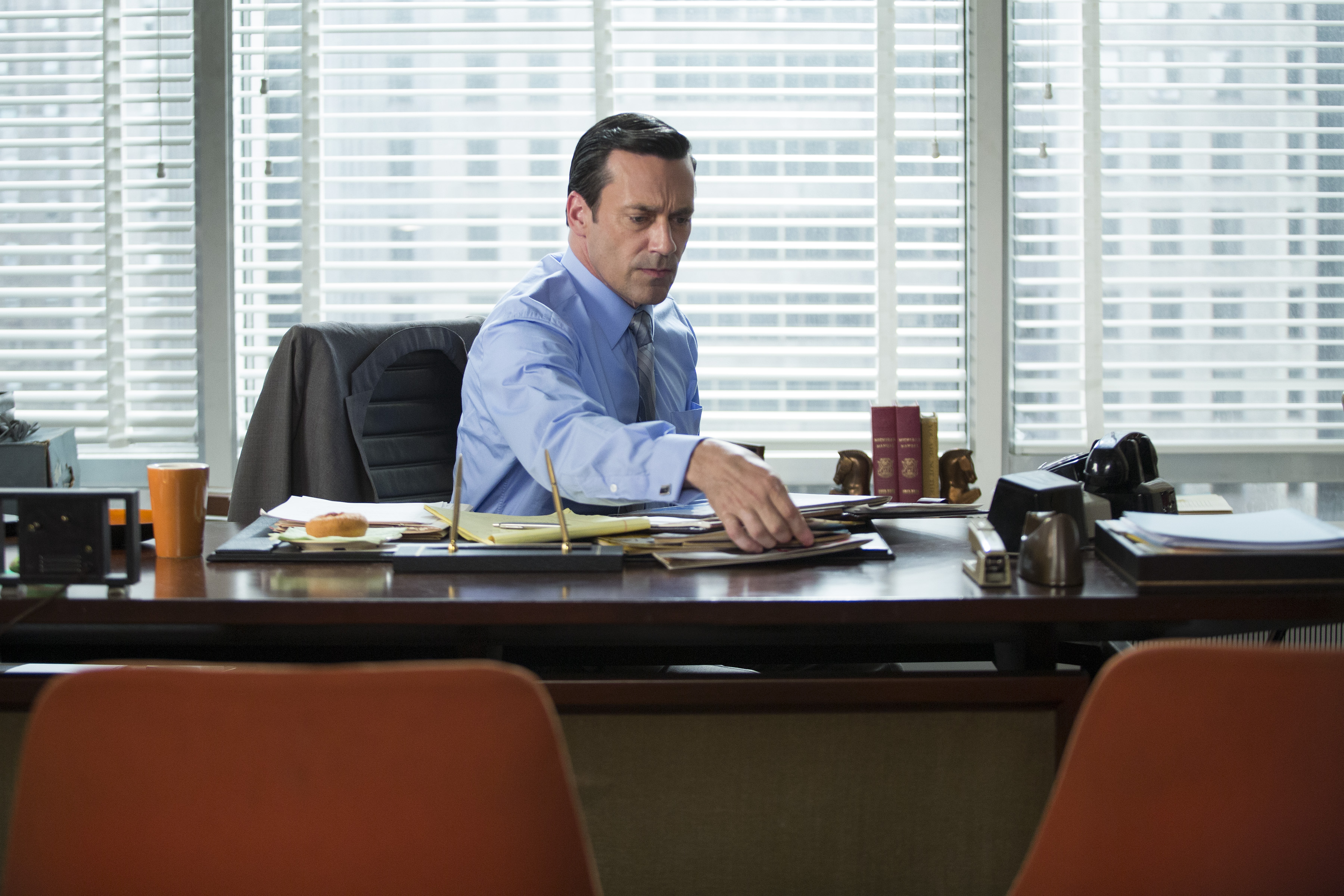Mad Men recap: 'The Forecast'
In a strong episode, Mad Men explores its own past while looking to the future


After last week's meandering digression, this week's "The Forecast" feels like a reward for longtime Mad Men fans, packed with references to stories and episodes past. It features the welcome return of characters both beloved (Sally Draper) and loathsome (Lou Avery) — as well as the triumphant and unexpected comeback of creepy Glen Bishop (Marten Holden Weiner), having one last awkward encounter with Betty before leaving for Vietnam.
Glen has always been a polarizing character among Mad Men viewers, but his evolution has been a fascinating one. When Glen was introduced as an 8-year-old in the show's first season, his story centered on his infatuation with Betty — a crush that was complicated by Betty's own childlike tendencies. ("I wish I was older," said Glen, uncomfortably, as Betty held his hand and cried during a chance encounter in a parking lot.) Glen's later appearances, as a teenager, tended to center on his relationship with Sally, which was infinitely more age-appropriate and infinitely more functional.
"The Forecast" unites both of those strands when Glen arrives at the Francis household, revealing that he has volunteered to serve in Vietnam. Sally is enraged, citing several reasons to oppose the war; Betty is impressed, lauding the bravery of his decision. It's a schism made creepier by both Betty and Sally's secret histories with Glen, and by the way that Betty, either consciously or unconsciously, positions herself as a kind of romantic rival to her daughter.
The Week
Escape your echo chamber. Get the facts behind the news, plus analysis from multiple perspectives.

Sign up for The Week's Free Newsletters
From our morning news briefing to a weekly Good News Newsletter, get the best of The Week delivered directly to your inbox.
From our morning news briefing to a weekly Good News Newsletter, get the best of The Week delivered directly to your inbox.
Sally quickly regrets the vitriol she levels at Glen, and unsuccessfully calls him to say goodbye. But Glen had a different target all along: Betty, whom he's apparently kept a torch for all these years. He turns up in the kitchen and attempts to kiss her. When she rebuffs him, he confesses that he only volunteered because he flunked out of college. "I know you know me. I know you know the man I can be," he says, in a hopeful reminder of the warped bond they've shared for more than a decade.
In the end, Betty doesn't actually hook up with the teenager she's known since he was a kid — but her flirting, despite Sally's obvious discomfort, is a reminder of just how selfish Betty can be. It's a quality she shares with her ex-husband, Don, whose ongoing downward slope has made him just as eager to impress the people who still fall for his act. When Don openly flirts with Sally's 17-year-old friend Sarah, she reacts with justifiable disgust: "I want to get on a bus, and get away from you and mom, and hopefully be a different person from you two." It may not be 2,500 words, but it's a clearer and smarter plan for the future than anything Don has written about SC&P.
Meanwhile, the list of people who do buy into the Don Draper mystique keeps getting shorter. Last week, Megan dismissed Don as an "aging, sloppy, selfish liar" — a mere prelude to the verbal battering Don gets in "The Forecast." Don's realtor tells him his apartment is a hard sell because it "reeks of failure" because a "sad person" lives there. "You don't have any character. You're just handsome. Stop kidding yourself," sneers Mathis.
Even Don seems vaguely aware that he's becoming a mere shadow of the already shadowy person he used to be. At the outset of the episode, Roger tasks him with a relatively simple project: write 2,500 words on the future of Sterling Cooper & Partners, with the vague, noble tenor of the Gettysburg Address. For a widely revered creative mind like Don's, it should be a cakewalk. But he spends most of the episode pathetically grasping at straws: reciting the opening lines of the actual Gettysburg Address, pulling quotes from an old memo, and bugging his colleagues for their thoughts on the project.
A free daily email with the biggest news stories of the day – and the best features from TheWeek.com
Unfortunately, one of those colleagues turns out to be Peggy. When she approaches Don for a performance review, he immediately segues into the kind of vague, existential yearning in which he specializes: What kind of future do you imagine for yourself? What if you get everything you want? What will you want after you get everything you want? Every question begets another question, until Peggy leaves Don's office in a rage, despite having basically told him upfront that she just wanted to hear him say, "You've done a great job this year."
The Don Draper approach to life backfires again when it comes to Mathis, who seeks Don's advice on repairing a client relationship after a bad pitch meeting. Despite a day in which he's done nothing but imagine SC&P's future, Don immediately launches into a romanticized story about his own past, in which he saved the company's relationship with Lucky Strike with a couple of bawdy jokes. When Mathis tries the same thing, the clients are horrified, and he's immediately dumped from the account.
What Don still doesn't understand is no one can be Don Draper except Don Draper. Most people don't want to muse about the meaning of life; they just want to hear that they're doing a good job. Most people can't play off a bad meeting with an edgy, aggressive joke; they just need to swallow their pride, make an apology, and move on. Even Don's idea of what Don accomplished is probably built on a lie. As Roger tells it, Don "saved" the Lucky Strike account because owner Lee Garner, Jr. had a crush on him.
But while Don refuses to let go of the past, Mad Men keeps insistently pushing into the future. As it winds down, Mad Men could have hearkened back to its past by rekindling the romance between Joan and Roger — just as it could have allowed Don to pursue a renewed affair with someone like Rachel Menken, or brought in one of Peggy's old boyfriends like Abe or Mark. Instead, the series has spent its final run of episodes on a series of new lovers who have, with varying degrees of success, allowed the series to filter its familiar characters through a fresh set of eyes.
In "The Forecast," Mad Men introduces another new suitor: Richard Burghoff (Bruce Greenwood), a retired real-estate millionaire who accidentally stumbles into SC&P's Los Angeles office. Richard is immediately entranced by Joan, and they eventually share the kind of cheery one-night-stand that leaves both parties wholly satisfied. But despite Joan's return to New York City, Richard can't let her go, turning up in the city for a second date.
As it turns out, a two-night-stand on Joan's turf is a more difficult proposition. On her business trip, Joan was unencumbered by the baggage of her day-to-day life: two divorces and a four-year-old son. Neither of those things are inherently bad, but they're enough to make a bachelor like Richard — who spent more than 20 years in an unhappy marriage for the sake of his children — consider whether more responsibility is really what he needs. "I have a plan, which is no plans," he explains. "You can't go to the pyramids. You can't go anywhere."
But after an unpleasant breakup, Richard shows up at SC&P's office the next day with a bouquet of flowers and an apology. It's the rare Mad Men romance that ends on an unambiguously happy note, and with the promise of more good things on the horizon. After everything we've seen Joan endure, it certainly feels like she deserves a happy ending with someone who loves everything about her.
Of course, Mad Men has also consistently reminded us that a seemingly happy ending isn't an ending at all. There was certainly a time when both Don and Megan would have said that they'd found true love together, and last week's episode ended with Don standing alone in his empty penthouse. "The Forecast" pushes Don even further to the fringes of the life he used to live: standing at the closed door of the penthouse apartment he once shared with Megan, while a happy young couple stands inside, signing the papers to take it away from him.
In three consecutive episodes, we've seen Don lose his wife, his possessions, and his apartment. But as Mad Men continues to strip Don clean, the big question has yet to be answered. Is the erosion of everything about "Don Draper" the final punishment for a man who spent most of his life on a self-serving lie? Or is it the unpleasant-but-necessary purifying process that will allow Don to rebuild himself into something better?
Previous Mad Men recaps:
Scott Meslow is the entertainment editor for TheWeek.com. He has written about film and television at publications including The Atlantic, POLITICO Magazine, and Vulture.
-
 31 political cartoons for January 2026
31 political cartoons for January 2026Cartoons Editorial cartoonists take on Donald Trump, ICE, the World Economic Forum in Davos, Greenland and more
-
 Political cartoons for January 31
Political cartoons for January 31Cartoons Saturday's political cartoons include congressional spin, Obamacare subsidies, and more
-
 Syria’s Kurds: abandoned by their US ally
Syria’s Kurds: abandoned by their US allyTalking Point Ahmed al-Sharaa’s lightning offensive against Syrian Kurdistan belies his promise to respect the country’s ethnic minorities
